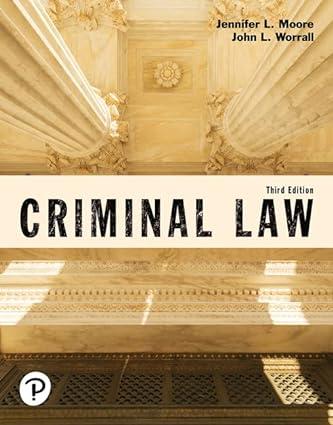Question
Korematsu is a 6-3 decision. Justice Black, ironically one of the Court's great civil libertarians, writes the majority opinion. He begins by pointing out that
Korematsu is a 6-3 decision. Justice Black, ironically one of the Court's great civil libertarians, writes the majority opinion. He begins by pointing out that both the president -through an executive orderand Congress, by creating penalties for non-complianceauthorized the internment. In the Constitution, these branches are given war powers. Black then writes, ""[A]ll legal restrictions which curtail the civil rights of a single racial group are immediately suspect. That is not to say that all such restrictions are unconstitutional. It is to say that courts must subject them to the most rigid scrutiny. Pressing public necessity may sometimes justify the existence of such restrictions; racial antagonism never can." This sounds like strict scrutiny standard of review. As such, there ought to be a strong presumption of unconstitutionality. That presumption can be overcome if the government can show that it has (a) compelling interest (here, the prevention of espionage and sabotage during war) and (b) that the internment order (based on a racial classification) is narrowly tailored (there are no other non-racial alternatives) to achieve that compelling interest. For Black, the "exclusion from a threatened area... has a definite and close relationship to the prevention of espionage and sabotage." In other words, if we take what he wrote at face value, he believes the internment order to be narrowly tailored.
But was it? After all, the order is considerably underinclusive; it doesn't cover, say, German-American, Italian-American, and others who might be disloyal.[2] The order is also extremely overinclusive; it covers all Japanese-Americans, including the vast majority of who are unquestionably loyal. Black then says "Here,... we cannot reject as unfounded the judgment of the military authorities and of Congress that there were disloyal members of that population, whose number and strength could not be precisely and quickly ascertained. We cannot say that the war-making branches of Government did not have ground for believing that in a critical hour such persons could not readily be isolated and separately dealt with, and constituted a menace to the national defense and safety, which demanded that prompt and adequate measures be taken to guard against it."
Question: Korematsu Court Case: Did Justice Black really apply strict scrutiny standard of review?
Step by Step Solution
There are 3 Steps involved in it
Step: 1

Get Instant Access to Expert-Tailored Solutions
See step-by-step solutions with expert insights and AI powered tools for academic success
Step: 2

Step: 3

Ace Your Homework with AI
Get the answers you need in no time with our AI-driven, step-by-step assistance
Get Started


